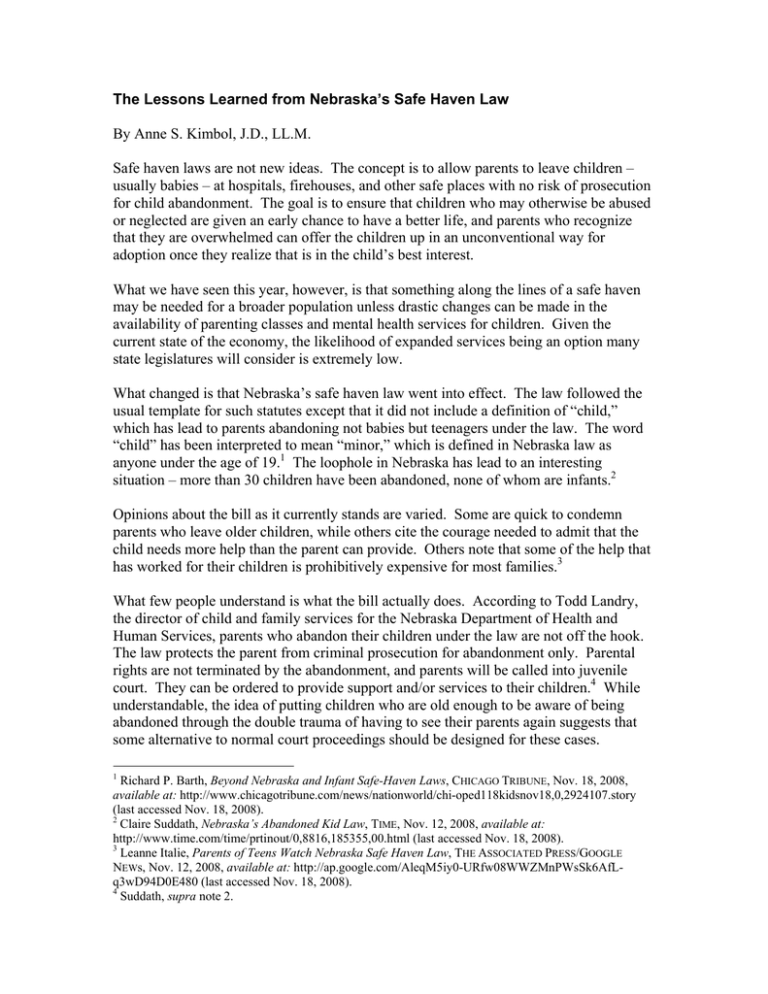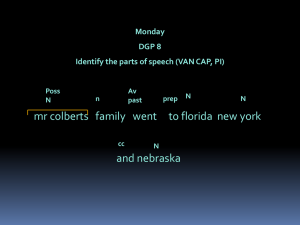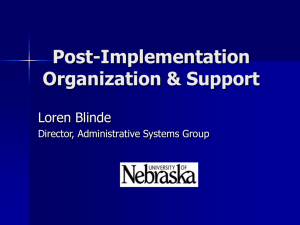The Lessons Learned from Nebraska’s Safe Haven Law
advertisement

The Lessons Learned from Nebraska’s Safe Haven Law By Anne S. Kimbol, J.D., LL.M. Safe haven laws are not new ideas. The concept is to allow parents to leave children – usually babies – at hospitals, firehouses, and other safe places with no risk of prosecution for child abandonment. The goal is to ensure that children who may otherwise be abused or neglected are given an early chance to have a better life, and parents who recognize that they are overwhelmed can offer the children up in an unconventional way for adoption once they realize that is in the child’s best interest. What we have seen this year, however, is that something along the lines of a safe haven may be needed for a broader population unless drastic changes can be made in the availability of parenting classes and mental health services for children. Given the current state of the economy, the likelihood of expanded services being an option many state legislatures will consider is extremely low. What changed is that Nebraska’s safe haven law went into effect. The law followed the usual template for such statutes except that it did not include a definition of “child,” which has lead to parents abandoning not babies but teenagers under the law. The word “child” has been interpreted to mean “minor,” which is defined in Nebraska law as anyone under the age of 19.1 The loophole in Nebraska has lead to an interesting situation – more than 30 children have been abandoned, none of whom are infants.2 Opinions about the bill as it currently stands are varied. Some are quick to condemn parents who leave older children, while others cite the courage needed to admit that the child needs more help than the parent can provide. Others note that some of the help that has worked for their children is prohibitively expensive for most families.3 What few people understand is what the bill actually does. According to Todd Landry, the director of child and family services for the Nebraska Department of Health and Human Services, parents who abandon their children under the law are not off the hook. The law protects the parent from criminal prosecution for abandonment only. Parental rights are not terminated by the abandonment, and parents will be called into juvenile court. They can be ordered to provide support and/or services to their children.4 While understandable, the idea of putting children who are old enough to be aware of being abandoned through the double trauma of having to see their parents again suggests that some alternative to normal court proceedings should be designed for these cases. 1 Richard P. Barth, Beyond Nebraska and Infant Safe-Haven Laws, CHICAGO TRIBUNE, Nov. 18, 2008, available at: http://www.chicagotribune.com/news/nationworld/chi-oped118kidsnov18,0,2924107.story (last accessed Nov. 18, 2008). 2 Claire Suddath, Nebraska’s Abandoned Kid Law, TIME, Nov. 12, 2008, available at: http://www.time.com/time/prtinout/0,8816,185355,00.html (last accessed Nov. 18, 2008). 3 Leanne Italie, Parents of Teens Watch Nebraska Safe Haven Law, THE ASSOCIATED PRESS/GOOGLE NEWs, Nov. 12, 2008, available at: http://ap.google.com/AleqM5iy0-URfw08WWZMnPWsSk6AfLq3wD94D0E480 (last accessed Nov. 18, 2008). 4 Suddath, supra note 2. Recognizing the problem they created by not defining what a child was, the Nebraska Legislature went into a special session to change the law. Testimony on two bills was heard on November 17, 2008 in the Nebraska Judiciary Committee. The first, LB1, was introduced by Mike Flood, the speaker of the Legislature, and would define a child for the purpose of the safe haven law as a child 72 hours of age or younger. The bill was passed out of committee with a vote of 7-1.5 The other bill considered by the committee was LB3, filed by Annette Dubas. LB3 would limit the safe haven to children one year of age or younger and would create a system to aid parents and guardians caring for children up to the age of 15. It also included procedures for termination of parental rights, delivery of appropriate services, and called for regional and statewide teams to offer consultation to parents needing services for their children. The intent, according to Dubas, was to create a solution to the overarching problem demonstrated by the abandonment of older children that could be in place until the Legislature meets in regular session to consider a larger legislative fix. No action was taken on LB3 by the Committee, at least in part because Attorney General Jon Bruning issued an opinion stating that it was beyond the scope of the call for the special session.6 This means that it could not properly be passed even with a supportive vote from the legislature. The day before the special session began, three more children were abandoned, one whose parent had driven up from Miami to take advantage of the law as it currently exists. Five of the children left at Nebraska safe havens have been from out-of-state. Notably, the majority of children had mental health histories, and nearly every child abandoned came from a single-parent household,7 suggesting to no one’s surprise that the strain of raising a pre-teen or teenager, particularly one who is not well, can be too much for one person. No matter what the Nebraska Legislature does during its special session to define “child” in a way to limit the safe haven’s scope to babies, the underlying problem exposed by the law will remain. People who have raised children for 10+ years are reaching a point where they are simply done. Their frustration level is so high that they are willing to drive their child to a hospital – either one nearby or one in a completely different part of the country – if they can do so without risk of criminal prosecution. Clearly the system for support has failed these parents and their children. In some cases, parents who need help are finding that services either are not available or are prohibitively expensive. In other cases, services are available, but those who need them either do not know of the services or are unaware of the process needed to obtain 5 Committee Hears Proposed Safe Haven Remedies, UNICAMERAL UPDATE, Nov. 17, 2008, available at: http://unicameralupdate.blogspot.com/2008/11/committee-hears-proposed-safe-haven.html (last accessed Nov. 18, 2008). 6 Id. 7 Karen Ball, The Abandoned Children of Nebraska, TIME, Nov. 18, 2008, available at: http://www.time.com/time/printour/0.8816.1859405,00.html (last accessed Nov. 18, 2008). them. From either a humanitarian or a strictly economic point of view, something must be done to change this situation. Parents and children are suffering, and the abandoned children are left with the trauma that brings as well as a potential perverted sense of parenthood. States – or in this case mostly Nebraska – are having to foot the bill to care for these children in the foster care system and/or for the process of getting them adopted. Money, time, and effort would in many cases be better spent keeping these families intact. This is not a new problem. The reality that parents were giving up their children so they could enter the foster system and get help has been recognized, although an ultimate solution has not been implemented. In Texas, the issue has been discussed on and off for years. During the Legislature’s 79th Regular Session, a bill was passed to ensure parental participation in decisions made for children who are placed in institutions and for whom the state has taken on financial responsibility.8 Two bills were filed – although neither was passed – during the 80th Regular Session to create a Children’s Behavioral Health Council to provide for coordinated behavioral health for children in an attempt to give parents and children the help they need and minimize the need for institutionalizing these children and/or placing them in the foster system.9 The Nebraska law and its unintended consequences have left some appalled, many saddened, and others relieved. But, emotions aside, we must recognize that this is a unique opportunity to take up a frank discussion of services for parents, including parenting classes, and services for children, including behavioral health services, on a nationwide scale. Sighing in relief when the Nebraska Legislature adjourns from its special session, pretending this is merely a problem in Nebraska, or otherwise failing to act would be the worst possible response for these children and parents in need. Health Law Perspectives (November 2008), available at: http://www.law.uh.edu/healthlaw/perspectives/homepage.asp 8 9 HB 2579, Tex. 79(R), 2005. HB 2339, Tex. 80(R), 2007; SB 1503, Tex. 80(R), 2007.






